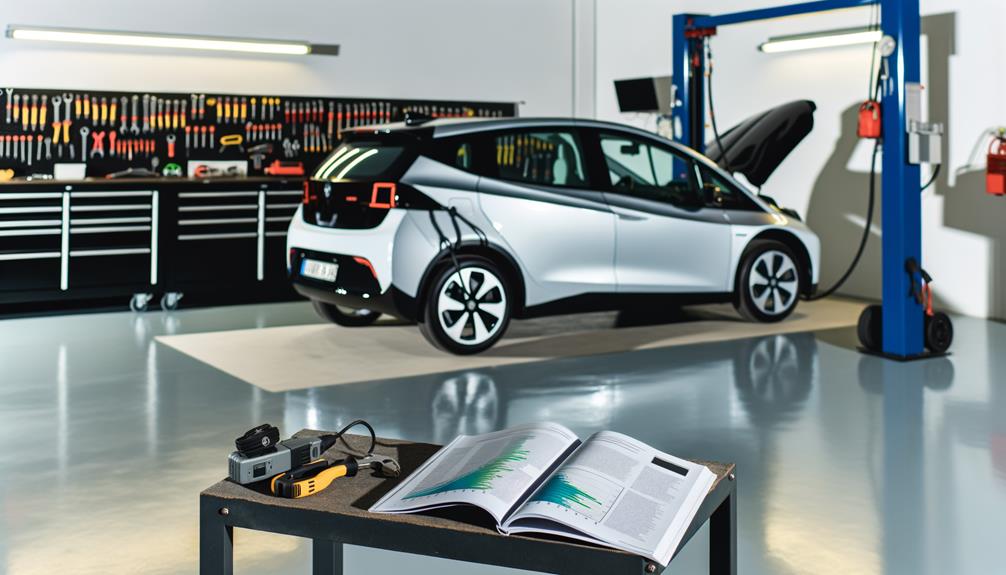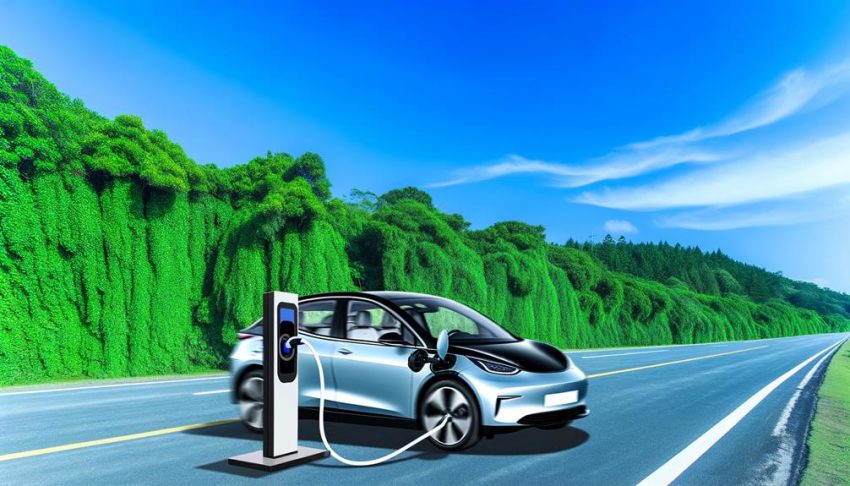You might be wondering if electric cars are actually reliable, especially given the buzz they've created. While EVs have certainly made strides, reliability remains a hot topic. Reports show that electric cars face 79% more issues than traditional gasoline vehicles, with common problems including electric drive motors and software glitches. Even with brands like Tesla improving their reliability ratings, there's still a lot of skepticism, particularly as new models hit the market. So, what does this mean for potential buyers like you? The answer isn't straightforward and warrants a deeper look into various factors influencing EV reliability.
Contents
Reliability Concerns in EVs
When evaluating the reliability of electric vehicles (EVs), it is crucial to take into account data-driven insights that highlight their specific challenges. According to a Consumer Reports survey, EVs exhibit 79% more reliability issues compared to conventional gasoline and diesel vehicles. This notable disparity is largely attributed to common problems with electric drive motors, charging systems, and battery reliability. These issues considerably contribute to the higher problem rates observed in EVs.
Survey data from the 2023 model year, however, indicates a narrowing reliability gap, with EVs showing a 21% increase in problems compared to gasoline vehicles, down from 80% in previous years. Despite this improvement, the reliability of EVs remains a critical concern. Plug-in hybrid electric vehicles (PHEVs), which combine internal combustion engines with electric drive systems, are particularly problematic, demonstrating 146% more issues than conventional cars. This is primarily due to the complexity of their dual power systems, which combines the challenges of both EV and traditional vehicle technologies.
Tesla, a leading name in the EV market, illustrates the mixed reliability landscape. While specific models like the Model 3 and Model Y have shown improvements, Tesla still faces considerable build quality issues, such as paint and trim flaws. These problems detract from the overall reliability perceptions of Tesla vehicles.
When comparing EVs to their conventional counterparts, it's clear that while strides have been made, considerable reliability issues persist. Continuous advancements in technology and quality control are crucial for closing this gap and enhancing consumer confidence in electric vehicles.
Tesla's Market Performance
Despite the ongoing reliability concerns within the electric vehicle sector, Tesla's market performance presents a more nuanced picture. Tesla's Model Y received a reliability recommendation for the first time in 2023, highlighting significant strides in minimizing reported problems compared to previous years. This improvement aligns with the consistent reliability of the Tesla Model 3, which continues to maintain its recommended status. These developments reflect Tesla's commitment to enhancing the quality of its vehicles.
In 2023, Tesla ranks 14th out of 30 automotive brands regarding reliability, an advancement from its 19th position in 2022. This jump underscores the brand's efforts in addressing persistent build quality issues, such as paint and trim defects, which have historically impacted customer satisfaction. While Tesla's powertrains exhibit commendable reliability, these build quality challenges remain a point of contention.
Tesla's extensive experience in EV production gives it a competitive edge, contributing to its relatively higher reliability scores compared to other automotive brands. The brand's market performance is bolstered by its ability to leverage this experience to continually refine its manufacturing processes and address previously reported problems.
However, it is crucial to recognize that while Tesla has made considerable progress, the journey towards ideal reliability isn't complete. The brand's ongoing efforts to enhance customer satisfaction through improved build quality and reduced reported issues will be critical in maintaining and improving its market position.
Hybrid Vehicles' Reliability

When considering the reliability of hybrid vehicles, you'll find they exhibit 26% fewer problems compared to conventional gasoline cars, primarily due to their simpler technology and extensive manufacturing history. Brands like Toyota, Hyundai, and Kia lead the pack, with models such as the Toyota Prius showcasing over 25 years of dependable service. Additionally, traditional hybrids have fewer potential problem areas, excluding charging issues, which reinforces their reputation for reliability over plug-in hybrids and electric vehicles.
Hybrid Longevity Insights
How do hybrid vehicles measure up regarding reliability? When you look at the data, hybrids are impressively reliable. They show 26% fewer problems compared to conventional gasoline and diesel vehicles. This superior reliability is reflected in Consumer Reports data, which consistently shows lower problem rates for hybrids than for both plug-in hybrids and fully electric vehicles (EVs).
One reason hybrids are so reliable is their technology. Non-plug-in hybrids have simpler systems compared to fully electric vehicles, reducing potential issues. Brands like Toyota, Hyundai, and Kia have leveraged their extensive experience in hybrid technology to produce high-quality, reliable vehicles. Toyota's Prius, a pioneering model in the hybrid market, has been in production for over 25 years and is a demonstration of the durability and reliability of hybrid technology.
Manufacturer Reliability Leaders
In the domain of hybrid vehicles, certain manufacturers stand out as leaders in reliability. Toyota, Hyundai, and Kia are at the forefront, with their hybrids showing 26% fewer problems than conventional gasoline vehicles. This reliability edge is vital, as hybrids bridge the gap between conventional and fully electric vehicles.
Toyota's long history with hybrids, starting with the Prius over 25 years ago, demonstrates their commitment to refining hybrid technology. This experience translates to fewer problems and higher reliability. According to Consumer Reports, Toyota hybrids often top the charts in reliability, a proof of their well-evolved gas-electric systems.
Non-plugged-in hybrids benefit from having just 19 potential problem areas, excluding charging issues, making them simpler and more reliable than fully electric vehicles. The streamlined technology in these hybrids results in fewer breakdowns and higher consumer satisfaction.
Here's a visual breakdown of these insights:
| Manufacturer | Key Strength | Reliability Insights |
|---|---|---|
| Toyota | Long history | Fewest problems due to evolved technology |
| Hyundai | Fuel efficiency | 26% fewer problems than conventional vehicles |
| Kia | Simplified design | Non-plugged-in hybrids have fewer issues |
These manufacturers have harnessed reliable technology to create hybrids that offer superior reliability and fuel efficiency, making them a smart choice for consumers.
Simplicity Equals Fewer Problems
Hybrid vehicles' reliability is significantly enhanced by their simplicity, as evidenced by their 26% fewer problems compared to conventional gasoline or diesel vehicles. This reduction in issues is largely attributed to the simpler technology inherent in hybrid vehicles. Major manufacturers like Toyota, Hyundai, and Kia have leveraged this simplicity to produce models with high reliability scores, boosting their reputation for dependability.
Hybrid vehicles benefit from having only 19 potential problem areas, excluding charging issues, unlike their plug-in counterparts. This reduced complexity translates into fewer potential problem areas and subsequently, fewer problems overall. Consumers prioritizing fuel efficiency and dependability over advanced features find hybrids a compelling choice.
Consider the following key points:
- Simpler Technology: Hybrid vehicles use less complicated systems, leading to fewer potential issues.
- Established Manufacturing: Long-standing models like the Toyota Prius, with 25 years of production, demonstrate proven reliability.
- Manufacturer Reputation: Brands like Toyota, Hyundai, and Kia are known for dependable hybrid models.
- Consumer Confidence: Reduced potential problem areas instill greater consumer trust in the reliability of hybrid vehicles.
Plug-in Hybrid Challenges
Plug-in hybrid electric vehicles (PHEVs) face significant reliability challenges, exhibiting 146% more issues than conventional vehicles due to the intricate combination of electric and gasoline systems. The complexity inherent in merging these two power sources increases the number of potential failure points, making PHEVs more prone to glitches compared to their gas-electric hybrid counterparts.
One remarkable example is the Chrysler Pacifica PHEV, which has been rated below average regarding reliability. It has encountered considerable problems with its hybrid drivetrain and charging components, illustrating the difficulties manufacturers face in harmonizing electric and gasoline systems. These issues aren't isolated incidents but are symptomatic of the broader reliability issues plaguing plug-in hybrid electric vehicles.
Despite these challenges, there are exceptions to the rule. The Toyota RAV4 Prime, for instance, stands out as a relatively reliable option within the PHEV category. Its success suggests that with careful engineering and robust testing, it is possible to mitigate some of the common reliability issues that plague other models.
However, the trend of brands with historically lower reliability, such as Jeep and Volvo, producing more plug-in hybrids, further exacerbates these challenges. These manufacturers' track records indicate a higher likelihood of encountering problems, contributing to the overall perception of PHEVs as less reliable.
Consumer Reports Insights

According to Consumer Reports' latest reliability survey, EVs exhibit 79% more problems than conventional gasoline vehicles, raising serious concerns about their dependability. The analysis, which scrutinized over 330,000 vehicles across 20 problem areas, highlights prevalent issues with electric drive motors, charging systems, and batteries. Despite technological advancements, newer EV models still show a 21% increase in problems compared to older gasoline vehicles, underscoring the need to evaluate specific model reliability before purchasing.
Reliability Survey Findings
In light of Consumer Reports' 2023 Annual Auto Reliability Survey, electric vehicles (EVs) continue to face significant reliability challenges compared to their gasoline counterparts, with EVs reporting 79% more problems across 20 problem areas. This reliability survey, which analyzed over 330,000 vehicles, highlighted several key issues in electric vehicles. Importantly, EVs struggle with electric drive motors, charging systems, and battery reliability, leading to longer repair times than conventional vehicles.
Tesla, despite its extensive experience in producing EVs, ranked just 14th out of 30 automotive brands, reflecting persistent build quality issues such as paint and trim flaws. While newer EV models show some improvement, the data still indicates a 21% higher problem rate for 2023 EVs compared to gasoline vehicles.
For a clearer understanding, consider these insights:
- EV Problems: 79% more issues in EVs compared to gasoline vehicles.
- Tesla's Rank: Tesla placed 14th out of 30 in reliability.
- Hybrid Reliability: Non-plug-in hybrids exhibited 26% fewer problems than conventional vehicles.
- Persistent Issues: Ongoing concerns include electric drive motors, charging systems, and battery reliability.
These findings suggest that while progress is being made, EVs still have significant reliability hurdles to overcome.
Common EV Issues
When examining the common issues that plague electric vehicles, it's evident that complexity often leads to reliability challenges. According to Consumer Reports, EVs report 79% more problems than conventional gasoline vehicles. These issues primarily arise from electric drive motors, charging systems, and battery reliability. Survey data indicates that 31% of EVs experienced issues within the first four years, compared to 20% for gasoline vehicles, highlighting significant reliability concerns.
A key area of concern is the build quality issues, with owners frequently reporting irregular paint and interior fitment problems. These defects contribute substantially to the overall problem rate. Additionally, the advanced technology in EVs, while offering enhanced features, often introduces new complexities. Infotainment systems and software glitches are common issues that further exacerbate the reliability concerns.
Interestingly, the latest survey data for 2023 shows improvement, with the problem rate for EVs narrowing the gap to only 21% more problematic than gasoline vehicles. This suggests that manufacturers are making strides in addressing these common issues. Nonetheless, the inherent complexities of electric vehicles and their advanced technologies continue to present challenges that need ongoing attention to guarantee reliability.
Industry Trends and Future Outlook
Electric vehicles (EVs) are at a critical juncture in the automotive industry, reflecting both significant advancements and persistent challenges. While EV technology has made substantial strides, reliability issues still exist. In 2023, EVs report 21% more reliability issues compared to conventional gasoline vehicles, a notable improvement from the previous 79%. This indicates that advancements in manufacturing practices and technology are effectively narrowing the reliability gap.
The industry trends point towards a focus on enhancing reliability and reducing costs due to intensifying competition, particularly from Chinese manufacturers. To meet growing consumer demand, automakers are prioritizing more reliable and cost-effective EVs. However, consumer skepticism remains a hurdle. The slowdown in EV sales growth from 90% year-over-year in June 2022 to 50% in June 2023 highlights the impact of these concerns.
Here are four key points to reflect upon:
- Reliability Issues: Common problems with electric drive motors and charging systems persist but are decreasing as technology advances.
- Manufacturing Practices: Improved practices are helping to bridge the reliability gap between EVs and gasoline vehicles.
- Consumer Demand: There's a clear need for more reliable EVs to satisfy growing consumer interest and reduce skepticism.
- Future Models: As EV technology evolves, future models are expected to offer better reliability, informed by extensive consumer feedback and rigorous testing.
Looking ahead, the ongoing evolution of EV technology and increased market experience from manufacturers are poised to further close the reliability gap. Consumer feedback will be vital in shaping future models, ensuring that EVs not only meet but exceed expectations regarding reliability and performance.
Frequently Asked Questions
How Reliable Are Fully Electric Cars?
Fully electric cars' reliability varies. You'll find issues with battery performance and charging infrastructure. However, advancements in technology, driving range, and market trends show improvement. Consider cost savings, environmental impact, and owner satisfaction for a thorough analysis.
How Long Do Electric Cars Last?
Electric cars can last over 10-15 years. Battery lifespan and driving range depend on charging infrastructure and technology advancements. Performance metrics and ownership costs are evolving. Consumer perceptions and market trends will influence resale value and environmental impact.
Do Electric Cars Require a Lot of Maintenance?
You won't need a lot of maintenance with an electric car. Focus on battery maintenance, tire rotation, software updates, brake system, coolant checks, charging infrastructure, drivetrain care, cabin filters, warranty coverage, and service intervals to guarantee peak performance.
What Is Negative About Electric Cars?
You might face charging infrastructure issues, battery lifespan concerns, and limited range anxiety. Expect higher initial costs, resale value uncertainty, and repair availability challenges. Extreme weather performance, charging time inconveniences, technology obsolescence fears, and environmental impact debates also arise.
Conclusion
In light of the data, you can see that while electric vehicles (EVs) have notable reliability issues—79% more than gasoline cars—there's significant progress, particularly from Tesla. However, hybrid vehicles often fare better in reliability, though plug-in hybrids face unique challenges. Consumer Reports highlight these concerns, reflecting broader market skepticism. As the industry evolves, it's essential to monitor these trends and advancements to make informed decisions about adopting new EV models.
